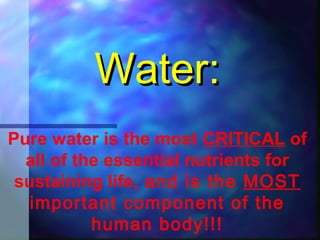Fn1 ppt. water
- 1. Water: Pure water is the most CRITICAL of all of the essential nutrients for sustaining life, and is the MOST important component of the human body!!!
- 2. How much of our body is water? About 60% of the body is made up entirely of water! BRAIN BONE MUSCLE BLOOD = 70% = 22% = 75% = 83%
- 3. What does water do for our bodiesâĶ ïŪ ïŪ ïŪ ïŪ ïŪ ïŪ Lubricates joints Protects body organs and tissues, brain, eyes, mouth and nose Helps flush out toxins through the liver and kidneys Regulates body temperature Carries nutrients & oxygen to cells Helps dissolve minerals making them accessible to the body
- 4. Water helps with digestion: Helps prevent constipation. Water works with fiber allowing waste to move freely through the digestive tract. ïŪ Helps the body to absorb nutrients in from the digestive tract such as water soluble vitamins ïŪ Water acts as a diluter in clearing waste from the body. If we eat right, most of our water intake comes from the FOODS we eat each day ïŪ
- 5. How much water is necessary? PERSONAL WATER NEEDS: BODY WEIGHT divided by 2 EQUALS = necessary amount of water in ounces per day! 200 lbs. = 100 oz. 2 ïŪIf you exercise, you should drink an additional 8 oz. of water for every 20 minutes you are active!
- 6. Signs of Dehydration: ïŪ ïŪ ïŪ ïŪ ïŪ ïŪ ïŪ ïŪ Extreme thirst Dark Urine /Strong Odor /Low Volume Dark Sunken Eyes Low Energy/Fatigue/ Dizzy / Headaches Irritability / Emotional Instability Loss of skin elasticity/ Muscle aches Diarrhea / Vomiting Blood pressure imbalance / Severely low or dangerously elevated heart rate






